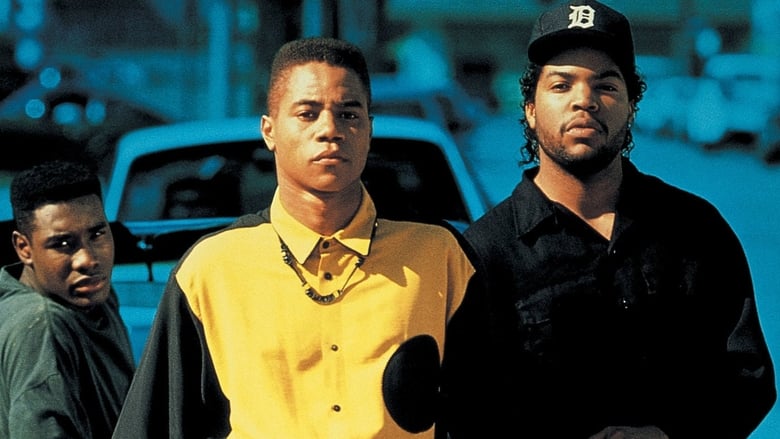← Back to Reviews

in
#490 - Boyz n the Hood
John Singleton, 1991

Centres on the lives of three African-American teenagers as they come of age in South Central L.A.
How legitimate is the criticism that a film has not "aged well"? Granted, a film's more distinctive period details and sensibilities can actually be strikes against it, but on the other hand such a film can also be seen as a cinematic snapshot of a certain historical period and location that deserves recognition on that basis alone. If nothing else, Boyz n the Hood does a fairly decent job of providing the latter as it is loosely based off writer-director Singleton's experiences growing up in Los Angeles. After a lengthy prologue set in 1984 that introduces us to the leads as kids, the film jumps forward seven years to re-introduce them as teenagers. The protagonist (Cuba Gooding Jr.) is learning how to be a man from his extremely serious yet approachable father (Laurence Fishburne) but he is still caught between his two (related) best friends - one a gang-banger (Ice Cube) and the other a football scholarship hopeful (Morris Chestnutt).
However, the attempt to capture the reality of life in the African-American community does come across as more than a little heavy-handed in some of its points. This results in the film's best scenes also coming across as the worst scenes for the very same reasons. Examples include Fishburne (who gives what is easily the best performance in the film) occasionally stopping the film dead to deliver Singleton's messages, whether it's snarking at a black police officer that racially profiles other black citizens or the part where he waxes lyrical about the gentrification of black neighbourhoods. This even extends to him lecturing Gooding Jr. about safe sex, which is also another thing that needed to be heard, sure, but only adds to the criticisms that lingered in the back of my mind about how the film was essentially "an after-school special with cursing". Such a criticism especially applies to Chestnutt's story and his struggles to make it out of the 'hood, while Cube is virtually content to hang out with his gangster crew. Gooding Jr. gets the driving arc but that just results in his character generally being a blank slate to be manipulated by the world and characters around him, with his only real desire being for the girl next door (Nia Long). The soundtrack alternates between period-appropriate hip-hop and also more conventional orchestra score, further reflecting how this film ends up being caught between being a truthful depiction of hood life and a more conventional piece that feels like it's been crafted by an outsider looking in on this world. It makes me want to re-watch Menace II Society to see if the problem is limited to just Singleton's film or if it is endemic to other films of the same genre and period.
John Singleton, 1991

Centres on the lives of three African-American teenagers as they come of age in South Central L.A.
How legitimate is the criticism that a film has not "aged well"? Granted, a film's more distinctive period details and sensibilities can actually be strikes against it, but on the other hand such a film can also be seen as a cinematic snapshot of a certain historical period and location that deserves recognition on that basis alone. If nothing else, Boyz n the Hood does a fairly decent job of providing the latter as it is loosely based off writer-director Singleton's experiences growing up in Los Angeles. After a lengthy prologue set in 1984 that introduces us to the leads as kids, the film jumps forward seven years to re-introduce them as teenagers. The protagonist (Cuba Gooding Jr.) is learning how to be a man from his extremely serious yet approachable father (Laurence Fishburne) but he is still caught between his two (related) best friends - one a gang-banger (Ice Cube) and the other a football scholarship hopeful (Morris Chestnutt).
However, the attempt to capture the reality of life in the African-American community does come across as more than a little heavy-handed in some of its points. This results in the film's best scenes also coming across as the worst scenes for the very same reasons. Examples include Fishburne (who gives what is easily the best performance in the film) occasionally stopping the film dead to deliver Singleton's messages, whether it's snarking at a black police officer that racially profiles other black citizens or the part where he waxes lyrical about the gentrification of black neighbourhoods. This even extends to him lecturing Gooding Jr. about safe sex, which is also another thing that needed to be heard, sure, but only adds to the criticisms that lingered in the back of my mind about how the film was essentially "an after-school special with cursing". Such a criticism especially applies to Chestnutt's story and his struggles to make it out of the 'hood, while Cube is virtually content to hang out with his gangster crew. Gooding Jr. gets the driving arc but that just results in his character generally being a blank slate to be manipulated by the world and characters around him, with his only real desire being for the girl next door (Nia Long). The soundtrack alternates between period-appropriate hip-hop and also more conventional orchestra score, further reflecting how this film ends up being caught between being a truthful depiction of hood life and a more conventional piece that feels like it's been crafted by an outsider looking in on this world. It makes me want to re-watch Menace II Society to see if the problem is limited to just Singleton's film or if it is endemic to other films of the same genre and period.
